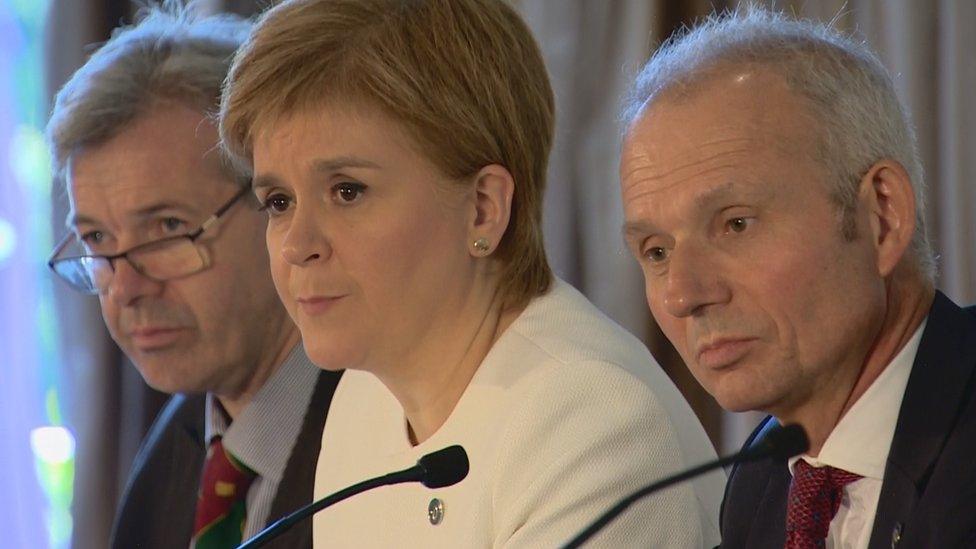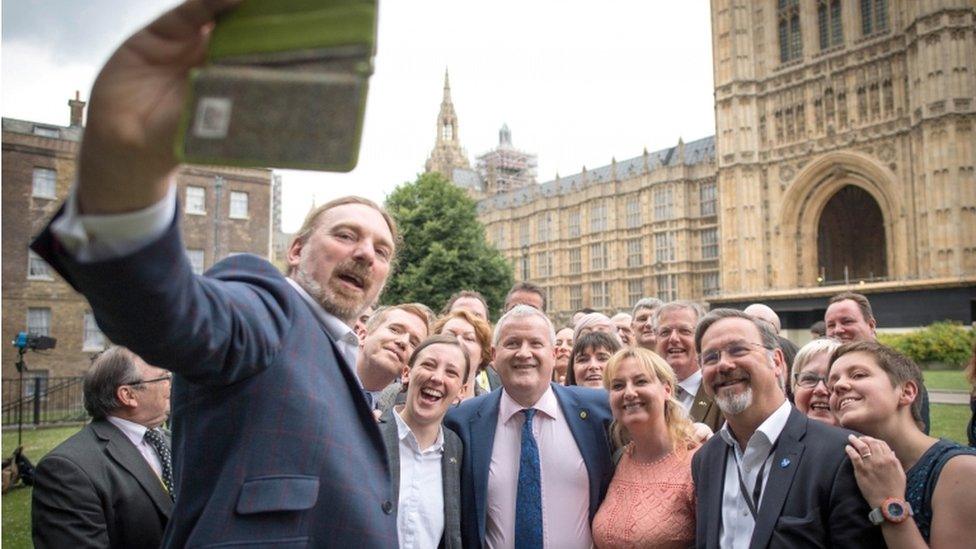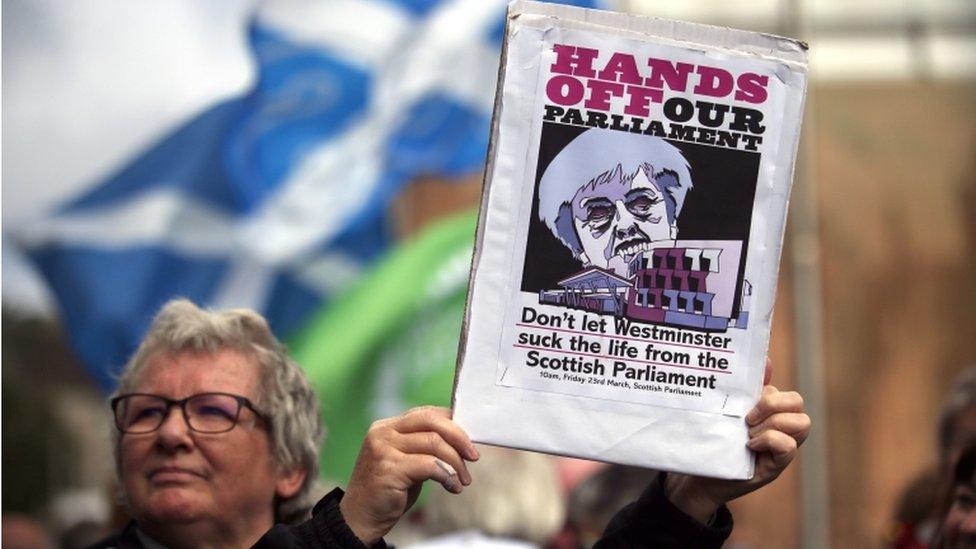Holyrood 'won't approve any Brexit bills'
- Published
- comments

Nicola Sturgeon and David Lidington (right) held talks in Guernsey on Friday
Holyrood will not give consent to any further Brexit legislation until the "broken" devolution system is fixed, Scotland's Brexit Minister has said.
Michael Russell said the Scottish government no longer trusted UK ministers after they pushed through the Brexit bill last week.
He was speaking as Nicola Sturgeon held talks in Guernsey with UK Cabinet Minister David Lidington.
Both said they wanted to rebuild their relationship and move forward.
Relations between the Scottish and UK governments are said to be at their lowest ever level after the Commons last week spent less than 20 minutes debating the EU Withdrawal Bill's impact on devolution, despite the Scottish Parliament voting to withhold consent.
Ms Sturgeon has accused the UK government of "ripping up" the devolution settlement.
The first minister also said she was "proud" of SNP MPs who walked out of Prime Minister's Questions in protest over the UK government's handling of the bill.
The walkout was derided by opponents as a "pre-arranged stunt" aimed only at furthering the cause of independence.

Ms Sturgeon has said she was proud of SNP MPs who walked out of the Commons last week
Senior SNP and Scottish government figures have said the protest was not a one-off, and it would not be "business as usual" for devolution.
Speaking to the BBC's Good Morning Scotland programme, Mr Russell said he "couldn't conceive of circumstances" where MSPs would vote to give approval for further UK legislation related to leaving the EU, such as trade, agriculture and fisheries.
He added: "We are absolutely clear that the way that devolution operates and the structures of devolution have failed, and they failed because the UK government is refusing to operate them.
"For example, on the Sewel Convention, we need to have the interpretation of that written down in statute and made legally binding, because what we've presently got is a situation where the UK government makes the rules and then breaks them themselves, and there are no sanctions."
He said that, while there was "practical work" to do to prepare for Brexit, "it is very difficult to do that work because, frankly, we don't trust the UK government with it".
Ms Sturgeon and Mr Lidington held talks at a British-Irish Council meeting in Guernsey, which was also attended by Irish Taoiseach Leo Varadkar, Welsh First Minister Carwyn Jones and representatives from Guernsey, Jersey and the Isle of Man.
The Welsh government dropped its opposition to the Brexit bill after accepting changes made by the UK government.
'Should be consent'
But Mr Jones told BBC Scotland that he backed the Scottish government over the consent row, adding: "It is fundamental to the operation of devolution that there should be consent."
In a joint media conference, Ms Sturgeon acknowledged that the EU Withdrawal Bill has eroded trust between the Scottish and UK governments, and insisted she was "very keen to see how we can rebuild it and re-establish it".
But she said the relationship could only be rebuilt through "the principle of consent and respect for the conventions that in Scotland's case have underpinned the devolution settlement for 20 years".
The first minister later told BBC Scotland that the UK government had been "operating as if the Sewel Convention is fine as long as we agree with them but as soon as we disagree they will simply ignore it".
She echoed Mr Russell in saying Sewel should be written down in law, adding: "What we've seen the last couple of weeks is that the convention isn't worth the paper is written on and we cannot proceed on that basis."
The UK government says this would effectively give the Scottish government a veto over legislation that affects the whole of the UK.
Mr Lidington, who sat next to Ms Sturgeon in the media conference, said trust was "certainly important" and that there had been "serious disagreement" over the Brexit bill.
He added: "I obviously disagree with Nicola's analysis and I believe the Sewel Convention has been upheld in full, as indeed Lord Sewel himself has said."
'Mutual respect'
Mr Lidington said his discussions with Ms Sturgeon and Mr Russell in Guernsey had been "frank" but that "we have listened to each other with I hope a certain degree of mutual respect."
He said: "We have sought to explore where there might be ways in which we can rebuild an effective way of working together, which is going to be necessary in the future.
"At the end of the day what matters is the wellbeing, the prosperity and the security of the people whom all of us have been elected to represent."
Ahead of the meeting, Ms Sturgeon and Mr Jones issued a joint statement in which they repeated their call for the UK to remain in the single market and customs union after Brexit - which has already been ruled out by Prime Minister Theresa May.
Airbus announced on Friday morning that it could leave the UK if the country exits the European Union single market and customs union without a transition deal.
Mr Russell said the announcement was further evidence of the "carnage" in terms of jobs and the economy that Brexit could bring.

Protests against the so-called "power grab" have been held outside the Scottish Parliament
What is the row all about?
The EU Withdrawal Bill has been at the centre of a long-running row between Edinburgh and London, and has been pushed through by the UK government despite MSPs at Holyrood voting overwhelmingly to refuse grant consent.
It is the first time this has happened since the Scottish Parliament was created in 1999.
The UK government is committed to "not normally" passing laws that impact on devolved powers under something known as the Sewel Convention.
But it argues that Brexit means these are not "normal" times, and that it needed to act despite not having Holyrood consent in order to allow a smooth transition after the UK leaves the EU.
The row over the Brexit bill centres on 153 powers in what are now devolved areas, but which were sent to Brussels when the UK joined the EU in 1973.
Westminster effectively wants to keep "temporary" control of 24 of these powers when they return to the UK after Brexit, with the remainder of the 153 going directly to the Scottish Parliament.
It says having control in key areas such as farming and food labelling for the first few years after Brexit will ensure the same rules continue to be followed across the UK.
The Scottish government wants all of the powers straight away - although it agrees that UK-wide rules and regulations are needed - and has repeatedly accused the UK government of a "power grab".
The Welsh government dropped its opposition to the bill after accepting changes made by the UK government.
